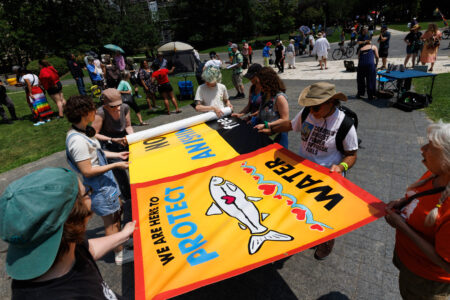
Canada has mastered the art of staging multi-sport international festivals. In addition to the forthcoming Winter Olympic and Paralympic Games in Vancouver, we have held two Olympics, two Pan American Games, two Commonwealth Games and similar events such as the World Student Games, the World Masters Games, the Gay Games and the World Out games in the last four decades. We’ve consistently won kudos for our facilities, organization and hospitality. It’s a record that few other countries, let alone middle powers with a population of just 33 million, can match.
Each of these games has served as a major vehicle for branding, community building and investment, not only in sport and physical activity but in housing, transportation, communication and technology. While none of the actual competitions lasted longer than 16 days, preparing for them steered urban planning and budgets for many years.
Major games are “multiple narratives.” In almost every case, there have been white elephants and scandals alongside concrete benefits and the highs of the events themselves. Benefits have rarely been shared equally across the population. But overall, international games have brought significant improvements to the communities involved, accelerating long-developed plans for infrastructural renewal. Vancouver 2010 will be another exemplary case. Even the 1976 Olympics in Montreal, much maligned because of extravagant stadium and cost overruns, gave a transformative stimulus to sport participation and sport tourism. Today, Quebec is one of the leading jurisdictions for sport and physical activity, an important accomplishment given the escalating social costs of physical inactivity, especially among the young. The strategy of seeking major games has been so effective that Toronto recently sought and won the right to stage the 2015 Pan American and Parapan American Games. I worked on that bid and am confident that those Games will bring otherwise elusive upgrades to the region.
But even with such a track record, it is time to review the priority Canadians place on major games. Despite Toronto’s success, it is becoming much harder for Canada to win the prize, as more countries and regions that have never had the chance seek to host them, and the international selectors are pressured to recognize the rising economies in the global south. The success of South Africa in landing the 2010 World Cup and Brazil, the 2014 World Cup and the 2016 Olympics may well be a trend. India, the world’s largest democracy, wants the Olympics; populous, oil-rich Nigeria, the Commonwealth Games. It is unlikely that they will be repeatedly denied.
Secondly, staging games is an inefficient, costly way to improve sports infrastructure, because they invariably require some facilities that are not needed (do we really need two world-class bob runs in western Canada?) and the resulting seating capacity, the most expensive part of construction, is rarely used after the games. Moreover, the costs of security and the difficult challenges they raise for public policy in a democratic society are bound to increase.
Thirdly, the strategy leaves those cities, regions and sports that cannot manage successful bids vulnerable to long droughts in public investment, as Ontario and the summer sports have recently experienced.
Canada thus needs a two-track strategy for seeking international games. The first track should be developing and implementing a comprehensive, pan-Canadian plan for creating the opportunities we need. If we need “a big idea to do a big thing,” as Ken Dryden once argued, then let’s tie the next round of major facility and program renewal to Canada’s sesquicentennial in 2017, as the provincial and territorial sports ministers have proposed, recalling that the last time many parts of the country got new facilities was the Centennial in 1967. Moreover, it’s not just facilities that are needed but training and employment of physical educators and coaches, investment in science and innovation, and reduction of the economic barriers to participation.
The second track should be making bids for major games based upon facilities and programs we already have rather than those we dream about building. Increasingly, as one senior IOC member told me in explaining why he would not vote for Toronto’s bid for the 2008 Olympics, the international community will go only to First World countries that show an exemplary commitment to the provision of opportunity for their own citizens, and no longer to those that want to use the leverage of international games to build what they do not have. Even if we lose those bids, Canadians will have the opportunities we need.
The current “action plan” for the federal-provincial-territorial Canadian Sport Policy comes to an end in 2012. What lies ahead will be much discussed when decision-makers gather in Vancouver. If Canadians are to benefit from our rich history of major games, we must commit ourselves to doing the right thing for sport whether we get another games or not.
Photo: Shutterstock








